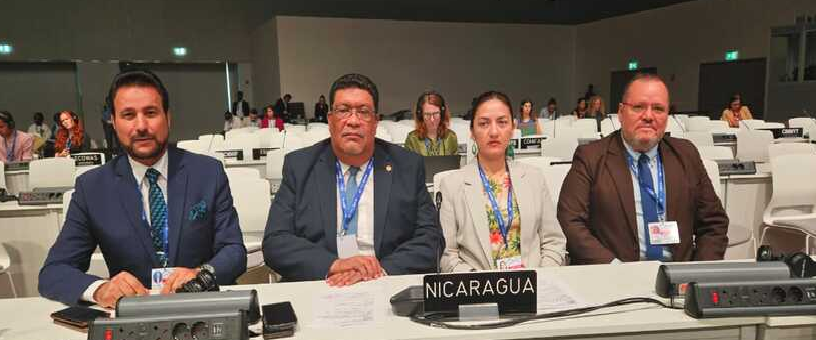Nicaragua demands Climate Justice and Reparation at COP 28 held in Dubai: Statement at 28th UN conference on Climate Change (COP 28) (Spanish and English)
2. We strongly express our support and solidarity with the Brotherly Palestinian People whose cause is present in the global consciousness. Nicaragua recognizes the historical struggle and the right of the Palestinian people to self-determination.
3. 10 countries with the highest emissions in the world emit more than 83%, while our country emits less than 0.05% of global emissions. Nevertheless, we suffer the impacts affecting up to 8% of our GDP.
5. It is essential that capitalist countries reduce emissions by at least 50% towards 2030.
7. The root of the reasons for Climate Change is the destructive model of production and consumption of the large capitalist economies. What we knew as climate change has become a Climate Crisis, a Planetary Crisis and a Crisis of Values.
8. Capitalist countries must comply with their financial commitments, at least regarding the previously agreed U$100 billion annually.
10. The capitalist countries have failed to comply with the Paris Agreements, because their emissions continue to increase, exceeding the norm established by science up to four times, and because they are irresponsibly promoting false options, such as carbon neutrality, thereby seeking to shift their responsibilities to developing countries, while continuing to refuse to recognize the just concept of reparations for affected countries.
.
NicaNotes: Why are Women in Nicaragua More Likely to Survive Childbirth Than Women in the US? In the US, 80% of maternal deaths are entirely preventable. Nicaragua, over the past 15 years: despite being one of the poorest countries in the Western Hemisphere, it has managed to reduce maternal mortality by 70% and infant mortality rates by 56%.
With Nicaragua’s universal free healthcare system, all prenatal, childbirth and post-natal offered free of charge – premature births, c-sections, neonatal ICU stays and, incredibly, even fetal surgeries are all free. Home births, previously common especially in rural areas, are now nearly unheard-of – 97% of all births are in hospitals. Lay midwives who once attended home births have now been incorporated into the healthcare system to provide prenatal and in-hospital birth support.
For parents who still live far from hospitals, a network of 181 maternity waiting provide space for nearly 70,000 women per year to stay near a hospital for the last two weeks of their pregnancy. Food, housing and vocational training are provided free of charge; women rest and are checked by medical staff regularly and, when they go into labor, they give birth safely in the hospital next door.
.
John Perry: Nicaragua’s Finance Minister Details How U.S. Sanctions Impact Nicaragua’s Poor While the US conducts a sustained campaign denigrating the FSLN government, it no longer has the organization within Nicaragua—an extensive network of NGOs, media outlets and “human rights” bodies funded from US sources—that facilitated the attempted 2018 coup. These have been dislodged by the Sandinista government.
The economic warfare of sanctions on Nicaragua are of three kinds. First are those aimed at restricting Nicaragua’s access to international bodies such as the International Monetary Fund and World Bank. Second are trade restrictions, directed at Nicaraguan exports. Third are personal sanctions, now covering dozens of individual Nicaraguan officials.
Nicaragua has had an excellent reputation for implementing successful projects using financing from bodies such as the World Bank and Inter-American Development Bank. Even before the passage of the NICA Act, Washington began to use its influence within these banks to reject most of the proposals that Nicaragua put forward. This continued even during the pandemic.
Over the five years from 2018, Nicaragua might have expected to receive a total of $2.5-$3 billion in development funding from these bodies. It has only received perhaps 10% of this amount (limited funding related to the pandemic and to the damage caused by two severe hurricanes in November 2020).

Events
January 27, 2024: Latin America conference in London 18th annual conference in solidarity with Latin American progressive movements.
.
Upcoming Delegations to Nicaragua
Casa Ben Linder 2024 delegations:
February 10-19: The Bird Brigade: Birding in Solentiname Arquipelago
March 2-10: Sindicatos & Solidaridad: Labor Movements in Nicaragua
9-21 July 9-21: Solidarity in Action: Celebrating 45 Years of Revolution in Nicaragua
.
Nicaragua Solidarity Coalition: nicasolidarity.net
Sign up to receive the Nicaragua Solidarity Coalition weekly newsletter; email NicaraguaSolidarityCoalition@gmail.com
Our monthly zoom meetings: second Monday of the month (next: January 8), 2:30 PM ET. Email NicaraguaSolidarityCoalition@gmail.com in advance to request Zoom access for the meeting, or to make other inquiries.
Organizations: Apply for coalition membership here This is an important way to increase the influence of our coalition work, as our membership list grows.
Listserve:nicanet@googlegroups.com join at groups.google.com/g/nicanet
Sign up to receive the weekly Nica Notes: https://afgj.org/signup
Facebook: Friends of Sandinista Nicaragua, Nicaragua Solidarity Coalition
Twitter: @SolidarityNica
Instagram: @NicaSolidarity
